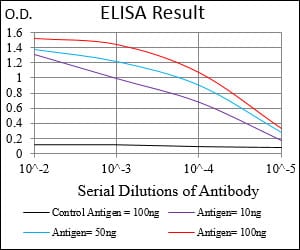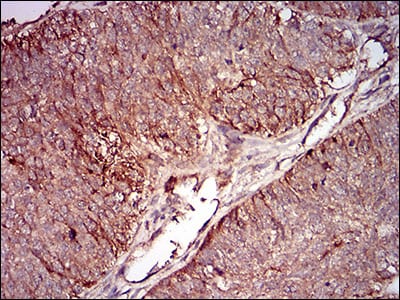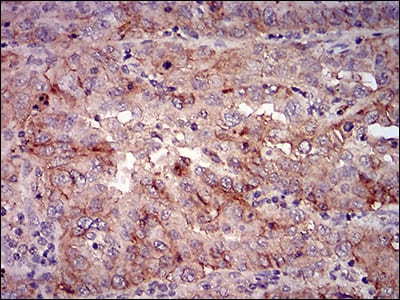



| WB | 咨询技术 | Human,Mouse,Rat |
| IF | 咨询技术 | Human,Mouse,Rat |
| IHC | 1/200 - 1/1000 | Human,Mouse,Rat |
| ICC | 技术咨询 | Human,Mouse,Rat |
| FCM | 1/200 - 1/400 | Human,Mouse,Rat |
| Elisa | 1/10000 | Human,Mouse,Rat |
| Aliases | Psp; Bpifa2e;msplunc2 |
| Entrez GeneID | 19194 |
| clone | 3F8E4 |
| WB Predicted band size | 24.8kDa |
| Host/Isotype | Mouse IgG1 |
| Antibody Type | Primary antibody |
| Storage | Store at 4°C short term. Aliquot and store at -20°C long term. Avoid freeze/thaw cycles. |
| Species Reactivity | Human |
| Immunogen | Purified recombinant fragment of mouse mSplunc2 (AA: 16-169) expressed in E. Coli. |
| Formulation | Purified antibody in PBS with 0.05% sodium azide. |
+ +
以下是3篇涉及BPIFA2抗体的相关文献摘要信息:
1. **文献名称**: *"BPIFA2/SPLUNC1 expression in oral squamous epithelium"*
**作者**: Bingle, L., et al.
**摘要**: 研究通过免疫组化分析人唾液腺及口腔黏膜中BPIFA2蛋白的表达模式,使用特异性抗体证实其在表层上皮细胞的定位,提示其在口腔先天免疫中的作用。
2. **文献名称**: *"Regulation of BPIFA2 expression in airway epithelial cells"*
**作者**: Chu, H.W., et al.
**摘要**: 报道BPIFA2在呼吸道炎症中的表达调控机制,利用Western blot和免疫荧光技术(基于商业化抗体)验证脂多糖及细胞因子对其表达的抑制作用。
3. **文献名称**: *"Role of BPIFA2 in chronic rhinosinusitis"*
**作者**: Zhang, Y., et al.
**摘要**: 通过ELISA和免疫组织化学分析慢性鼻窦炎患者鼻黏膜样本,发现BPIFA2蛋白水平下降,提示其抗菌功能缺失可能与疾病进展相关,研究中采用多克隆抗体进行蛋白定量。
(注:部分文献可能需结合具体实验需求进一步筛选,建议通过PubMed或SciHub按标题补充检索原文细节。)
**Background of BPIFA2 Antibody**
BPIFA2 (BPI Fold Containing Family A Member 2), also known as SPLUNC2. is a member of the bactericidal/permeability-increasing protein (BPI) family. It is primarily expressed in mucosal tissues, including the respiratory tract, oral cavity, and salivary glands. Structurally, BPIFA2 contains a conserved BPI-like domain, which may enable interactions with microbial components, such as lipopolysaccharides (LPS), though its precise biological functions remain less characterized compared to other BPI family members.
Antibodies targeting BPIFA2 are valuable tools for studying its role in innate immunity and mucosal defense. Research suggests BPIFA2 may modulate inflammatory responses and ion channel activity, potentially influencing airway surface liquid homeostasis. Dysregulation of BPIFA2 has been implicated in chronic inflammatory diseases (e.g., chronic rhinosinusitis, asthma) and cancers, particularly head and neck squamous cell carcinomas, where its expression may serve as a prognostic marker.
BPIFA2 antibodies are utilized in immunohistochemistry, Western blotting, and ELISA to assess protein localization, expression levels, and interactions in disease models. Recent studies also explore its therapeutic potential, including as a biomarker for early cancer detection or a target for anti-inflammatory therapies. However, further research is needed to fully elucidate its mechanisms and clinical relevance.
×